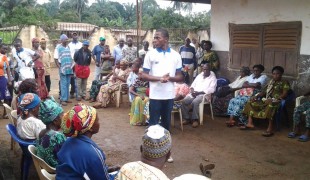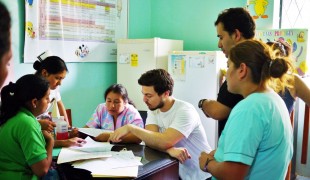- 4431
- 388
- 12
- 9
- 0
- Help Ukraine
About the solution
In many places, menstruation is still a barrier that prevents women to work and go to school. Also, health is at stake because of poor hygiene conditions. Sabrina Rubli and Ornella Marinic discovered the problem while they were working on their postgraduate degree, researching water and sanitation in Kenya. In 2013, they founded the Femme International non-governmental organisation to develop solutions for women.
"We were five women in this group, so naturally as women ... thinking about water and sanitation and latrines and toilets, we thought about menstruation," Sabrina said. According to Sabrina, the problem was addressed by some local non-governmental organisations but there was not a large-scale response although it was affecting millions of people.
The Twaweza Programme organised by Femme International has two components: education and distribution. Education is meant to help de-stigmatize the topic of menstruation and it targets both men and women. A kit is distributed to women participating in the programme to give them the tools for their hygiene. The kit includes a reusable cup or a package of reusable pads, a workbook, a bar of soap, a small towel, a bowl for boiling the menstrual cup,
"There wasn't enough education. Girls weren't learning really what it was ... and then the products available to them were not the safest," Sabrina said. She and her team developed a curriculum to provide education on women’s bodies, reproductive cycle, menstrual cycle, and hygiene. A pilot project was conducted in four Kenyan schools.
After the pilot, a girl who loved swimming received a reusable menstrual cup that allowed her to be ‘free’. "She was blown away by the fact that she could now swim, and the word that she used was, 'Now I feel free to do what I want.' And it's interesting because that word 'free' has come up so many times over the last six years with women in Kenya, women in Tanzania," Sabrina said.
In 2019, the initiative was in the top 30 innovators in Africa, list of the World Health Organisation. Femme International is financed by donations that cover the cost of the kit for women and the cost of the education programme.
Adapted from: https://www.cbc.ca/news/canada/ottawa/sabrina-rubli-menstruation-femme-i...
More information: https://www.femmeinternational.org/
https://www.youtube.com/watch?v=hL7CMxx3wYw&feature=emb_title
https://www.youtube.com/watch?v=hL7CMxx3wYw&feature=emb_title
This solution shall not include mention to the use of drugs, chemicals or biologicals (including food); invasive devices; offensive, commercial or inherently dangerous content. This solution was not medically validated. Proceed with caution! If you have any doubts, please consult with a health professional.
DISCLAIMER: This story was written by someone who is not the author of the solution, therefore please be advised that, although it was written with the utmost respect for the innovation and the innovator, there can be some incorrect statements. If you find any errors please contact the patient Innovation team via info@patient-innovation.com
-
-
546
-
0
-
7591

Man launches platform so that mothers and pregnant women can benefit from health services
COMMUNICATION: Communicating, whether by speaking, listening, or other means
(SELF)-CARE: HYGIENE: Maintaining personal hygiene
CAREGIVING
Pregnancy
App (Including when connected with wearable)
Website
Enhancing health literacy
Promoting self-management
Building Supportive Community Relationships
Promoting inclusivity and social integration
To improve Treatment/Therapy
Preventing (Vaccination, Protection, Falls, Research/Mapping)
Support on Puerperium/Post-childbirth
Raise awareness
General and Family Medicine
Gynecology and Obstetrics
Infectious Diseases
Pediatrics
Public Health
Tropical Medicine
Niger
-
-
-
537
-
0
-
12462

Man invents low-cost sanitary pad producing machine
-
-
-
497
-
0
-
6691

Woman creates vaccine reminder
-
 en
en